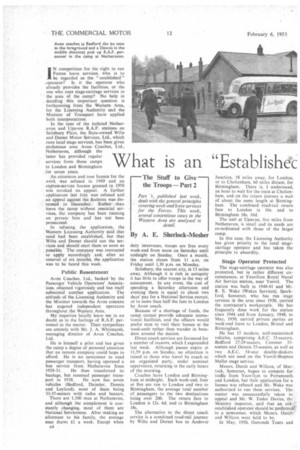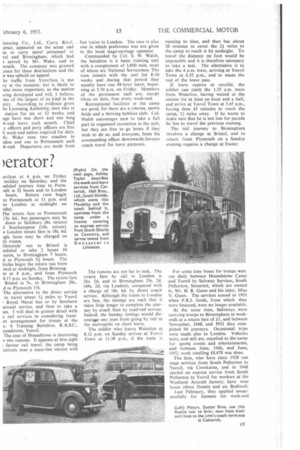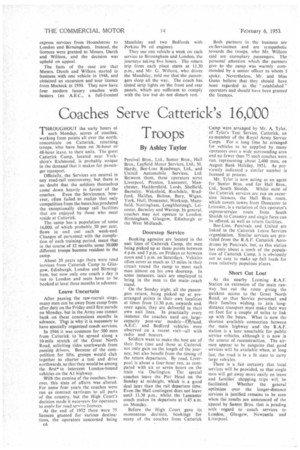What is an "Establish&
Page 42

Page 43

Page 44

If you've noticed an error in this article please click here to report it so we can fix it.
>erator?
— The Stuff to Give the Troops — Part 2 By A. E. Sherlock-Mesher
IN competition for the right to run Forces leave services, who is to be regarded as the "established " operator? Is it the operator who already provides the facilities, or the one who runs stage-carriage services in
. the area of the camp? No help in deciding this important question is forthcoming from the Western Area, for the Licensing Authority and the Minister of Transport have applied both interpretations.
In the case of the isolated Netheravon and Upavon R.A.F. stations on Salisbury Plain, the State-owned Wilts and Dorset Motor Services, Ltd., which runs local stage services, has been given preference over, Avon Coaches, Ltd., Netheravon, although the latter has provided regular services from those camps to London and Birmingham for seven years.
An excursion and tour licence for the work was refused in 1949 and an express-service licence granted in 1950 was revoked on appeal. A further application last July was refused and an appeal against the decision was dismissed in December.: Rather than leave the camp without essential services, the company has been running on private hire and has not been prosecuted.
.. In refusing the application, the Western Licensing Authority said that need had been established, but that Wills and Dorset should run the services and should start them as soon as possible. The company was instructed to apply accordingly and, after an interval of six months, the application was to be heard this week.
Public Resentment
Avon Coaches. Ltd., backed by the Passenger Vehicle Operators' Association, objected vigorously and has itself submitted another application. The attitude of the Licensing Authority and the Minister towards the Avon concern has angered independent operators throughout the Western Area.
My inquiries locally leave me in no doubt as to the feelings of R.A.F. personnel in the matter. Their sympathies are entirely with Mr. I. A. Whitmarsh, managing director of Avon Coaches, Ltd.
lie is himself a pilot and has given the camp a degree of personal attention that no remote company could hope to afford. He is no newcomer to road passenger transport, having operated a bus service from Netheravon from 1924-31. He then transferred to haulage, but resumed passenger trans port in 1938. He now has seven vehicles (Bedford, Daimler, Dennis and Leyland), most of them being 33-35-seaters with radio and heaters.
There are 1,100 men at Netheravon, and although the complement is constantly changing, most of them are National Servicemen. After making an
• allotment to his family, the average man draws £1 a week. Except when c4 duty intervenes, troops are free every week-end from noon on Saturday until midnight on Sunday. Once a month, the station closes from 11 a.m. on Friday until 1.30 p.m. on Monday.
Salisbury, the nearest city, is 13 miles away. Although it is rich in antiquity it has little to offer troops in the way of amusement. In any event, the cost of spending a Saturday afternoon and evening there is equal to about two days' pay for a National Service recruit, or to more than half the fare to London by Avon coach.
Because of a shortage of funds, the camp cannot provide adequate recreational facilities, and the officers would prefer men to visit their homes at the week-ends rather than wander in boredom around the station.
Direct coach services are favoured for a number of reasons. which I expounded last week. Although passes expire at 11.59 p.m. on Sunday, no objection is raised to those who travel by coach as an organized party, under nominal supervision, returning in the early hours of the morning.
Coaches leave London and Birmingham at midnight. Each week-end, four or five are run to London and two to Birmingham, the average total number of passengers to the two destinations being over 200. The return fare to London is 12s. 6d. and to Birmingham 18s.
The alternative to the direct coach service is a combined road-rail journey by Wilts and Dorset bus to Andover Junction, 18 miles away, for London, or to Cheltenham, 60 miles distant, for Birmingham.. There is, I understand, an hour to wait for the train at Cheltenham, and on the return journey a wait of about the same length at Birmingham. The combined road-rail return fare to London is 16s. and to Birmingham 18s. 10d.
The unit at Upavon, five miles from Netheravon, is small and its needs are co-ordinated with those of the larger camp.
In this case, the Licensing Authority has given priority to the local stagecarriage operator and has taken the principle to absurdity.
Stage Operator Protected The stage-carriage operator was also protected, but in rather different circumstances, at Yeovilton Royal Naval Air Service station, near Yeovil. The station was built in 1940-41 and Mr. R. E. Wake (Wakes Services), Sparkford. Somerset, who has run stage services in the area since 1930, carried the contractor's workpeople. He has frequently done work for the station since 1944 and from January, 1948, to May, 1950, carried private parties on week-end leave to London, Bristol and Birmingham.
He has 15 modern, well-maintained vehicles, comprising A.E.C. 33-seaters, Bedford 27-29-seaters, Commer 33seaters and Dennis 35-seaters, as well as two A.E.C. 54-seat double-deckers which are used on the Yeovil-Shepton Mallet stage service.
Messrs. Darch and Willcox, of MarLock, Somerset, began to compete for traffic from Yeovilton to Portsmouth and London, but their application for a licence was refused and Mr. Wake was authorized to run these services. The matter was unsuccessfully taken to • appeal and Mr. W. Tudor Davies, the Ministry inspector, said that an old-".• established operator should be preferrede to •a newcomer, which Messrs. Darch and Willcox were held to be.
In May, 1950, Osmonds Tours and
ineering Co., Ltd., Curry Rivet. ierset, appeared on the scene and in to carry naval personnel to to! and Birmingham, which had served by Mr. Wake, and to nouth. The company was granted :ence for these destinations and the it was upheld on appeal.
he traffic from Yeovilton is not vy at the moment, but is likely to ome more important, as the station reing developed and will, 1 believe, one of the largest of its kind in the litry. According to evidence given he Licensing Authority, men stay at station for six or 12 weeks, and ngs have one short and one long k-end leave each month. Chief y officers and petty officers are free h week-end unless required for duty. 4r. Wake runs two coaches to idon and one to Portsmouth each 'k-end. Departures are made from ovilton at 4 p.m. on Friday midday on Saturday, and the eduled journey time to Portsiuth is 3* hours and to London hours. Return runs begin m Portsmouth at 11 p.m. and rn London at midnight on aday.
[he return fare to Portsmouth 13s. 6d., but passengers may be down at Salisbury .(8s. return) Southampton (10s. return). e London return fare is 18s. 6d. igle fares may be charged on th routes.
Dsmonds' run to Bristol is ieduled to take 2 hours 10 runes, to Birmingham 7 hours, d to Plymouth 51 hours. The hides begin the return run from istol at midnight, from Birmingm at 8 p.m., and from Plymouth 8.15 p.m. on Sunday. The return fare Bristol is 7s., to Birmingham 20s., d to Plymouth 15s.
The alternative to the direct service to travel about 51 miles to Yeovil Royal Naval bus or by Southern ational service, and then to take a sin. I will deal in greater detail with e rail services in considering transirt arrangements for troops at the o. 6 Training Battalion, R.A.S.C., oundstone, Yeovil.
The case of Houndstone is interesting ir two reasons. It appears at first sight favour rail travel, the camp being latively near a main-line station with fast trains to London. The case is also one in which preference was not given to the local stage-carriage operator.
Commanded by Col. S. W. Walsh, the battalion is a basic training unit with a complement of 1,800 men, most of whom are National Servicemen. The men remain with the unit for 8-10 weeks and .during that period they usually have one 48-hour leave, beginning at 5.30 p.m. on Friday. Members of the permanent staff are, except when on duty, free every week-end.
Recreational facilities at the camp are good, for there are a-cinema, sports fields and a thriving hobbies club. Col. Walsh encourages men to take a full part in organized recreation in the unit, but they are free togo home if they wish to do so, and everyone, from the commanding officer downwards, favours coach travel for leave purposes.
The reasons are not far to seek. The return fare by rail to London is 26s. 2d. and to Birmingham 29s. 2d. (49s. 2d. via London). compared with a charge of 18s. 6d. by direct coach service. Although the trains to London are fast, the timings are such that it takes little longer to complete the journey by coach than by road-rail service. Indeed, the Sunday timings would discourfge any man from going by rail to the metropolis on short leave.
The soldier who leaves Waterloo at 8.12 p.m. on Sunday arrives at Yeovil Town at 11.38 p.m., if the train is running to time, and then has about 20 minutes to cover the 21 miles to the camp to reach it by midnight. To travel the distance on foot would be impossible and it is therefore necessary to take a taxi. The alternative is to take the 4 p.m. train, arriving at Yeovil Town at 6.52 p.m., and to waste the rest of the leave pass.
If leave expires at reveille, the soldier can catch the 1.35 a.m. train from Waterloo, having waited at the station for at least an hour and a half, and arrive at Yeovil Town at 5.45 a.m., having then 45 minutes to reach the camp, 21 miles away. If he wants to make sure that he is not late for parade he has to travel the previous evening.
The rail journey to Birmingham involves a change at Bristol, and to return from Plymouth on a Sunday evening requires a change at Exeter.
For some time buses for troops were run daily between Houndstone Camp and Yeovil by Safeway Services, South Petherton, Somerset, which are owned by Mr. H. R. Gunn and his sister, Miss V. Gunn. The services ceased in 1951 when P.R.1. funds, from which they were financed, were no longer available.
At the same time, Safeways were carrying troops to Birmingham at weekends at a return fare of £1, and between November, 1948, and 1951 they completed 94 journeys. Occasional trips were made also to London. Vehicles were, and still are, supplied to the camp for sports events and entertainments, and between June, 1946, and June, 1952, work totalling £8,478 was done.
The firm, who have since 1928 run stage services from South Petherton to Yeovil, via Crewkerne, and in 1948 started an express service from South Petherton to Yeovil for workers at the Westland Aircraft factory, have nine buses (three Dennis and six Bedford).
Last February, they applied unsuccessfully for licences for week-end express services from Houndstone to London and Birmingham. Instead, the licences were granted to Messrs. Darch and Willcox, and the decision was upheld on appeal.
The facts of the case are that Messrs. Darch and Willcox started in business with one vehicle in 1948, and obtained an excursion and tour licence from Martock in 1950. They now have four modern luxury coaches with heaters (an A.E.C., a full-fronted Mendslay and two Bedfords with Perkins P6 oil engines).
They use one vehicle a week on each service to Birmingham and London, the journeys taking five hours, The return trip from each place starts at 11.30 p.m., and Mr. G. Willcox, who drives the Maudslay, told me that the passengers sleep all the way. The coach has tinted strip lights on the front and rear panels, which are sufficient to comply with the law but do not disturb rest. Both partners in the business are ex-Servicemen and are sympathetic towards the troops, who Mr. Willcox said are exemplary passengers. The personal attention which the partners give to the camp was warmly commended by a senior officer to whom I spoke. Nevertheless, Mr. and Miss Gunn believe that they should have been regarded as the " established" operators and should have been granted the licences_




























































































